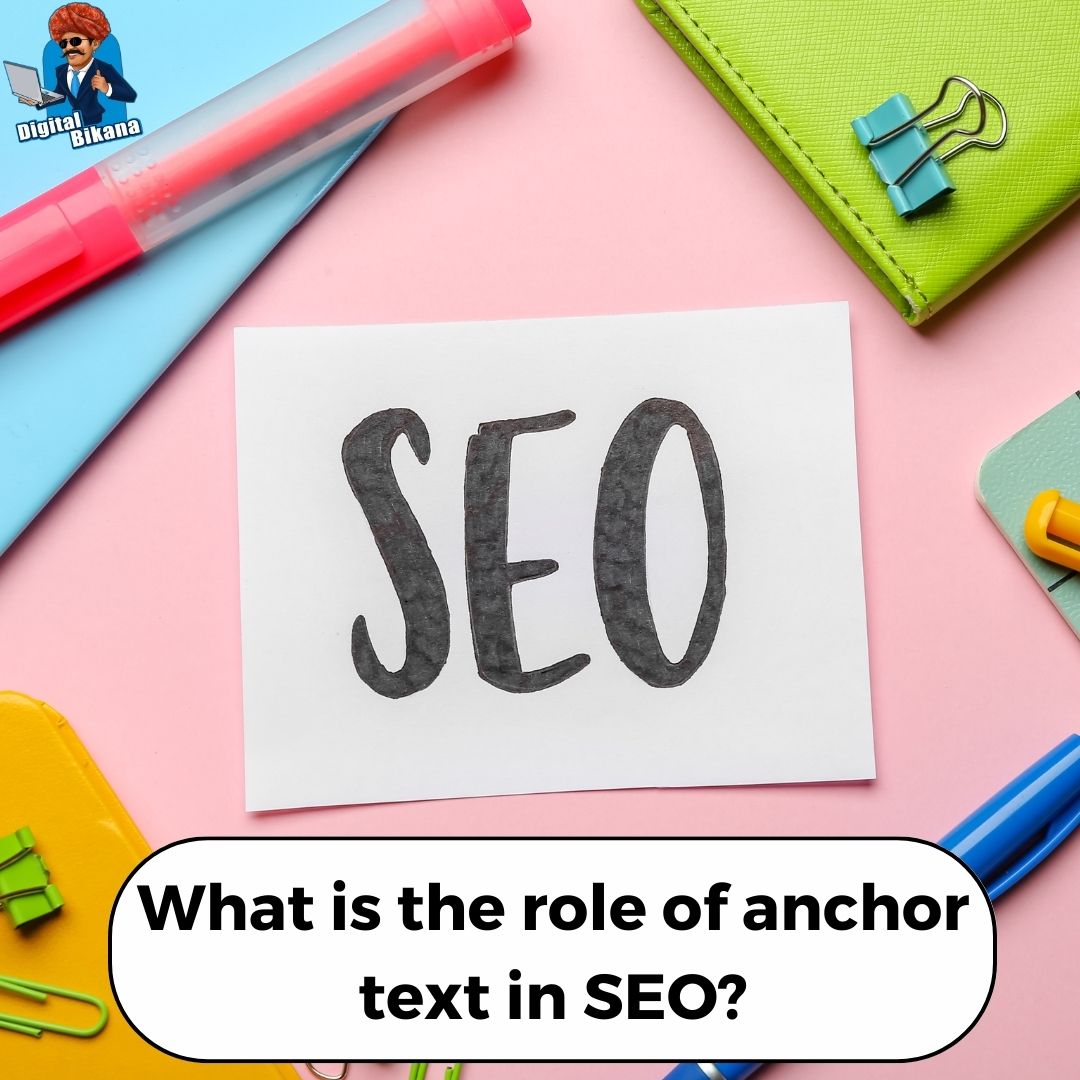What is the Role of Anchor Text in SEO?
In this article we are going to talk about What is the role of anchor text in SEO? In the vast landscape of search engine optimization (SEO), various factors influence a website’s visibility and ranking on search engine results pages (SERPs). One such important element is anchor text. It plays a significant role in SEO by providing context to search engines about the linked page’s content. In this article, we will delve into the role of anchor text in SEO and explore its various types, best practices, and impact on search rankings.
What is the Role of Anchor Text in SEO?
In this article, we will delve into the role of anchor text in SEO and explore its various types, best practices, and impact on search rankings.

1. Understanding Anchor Text
Anchor text serves as a valuable signal for search engines to understand the relevance and topic of a linked page. When a search engine crawls a webpage and encounters an anchor text, it analyzes the text’s content to determine the context and topic of the linked page. Anchor text helps search engines establish the relationship between different webpages and improve the accuracy of search results.
2. Types of Anchor Text
a) Exact Match Anchor Text
This type of anchor text includes the exact keyword or key phrase that matches the target page’s content. For example, if the target page is about “best SEO practices,” the anchor text would be “best SEO practices.” Exact match anchor text provides a clear signal to search engines about the content relevance.
b) Partial Match Anchor Text
Partial match anchor text contains a variation or partial match of the target page’s keyword or key phrase. For instance, if the target page is about “best SEO practices,” the anchor text could be “top SEO techniques” or “effective SEO strategies.” It still provides a relevant context but allows for some variation.
c) Branded Anchor Text
Branded anchor text uses the brand name or the business name as the clickable text. For example, if the target page is the homepage of a company named “ABC Solutions,” the anchor text could be “ABC Solutions” or “Visit ABC Solutions.” Branded anchor text helps strengthen brand recognition and signals the importance of the brand to search engines.
d) Naked URLs
Naked URLs serve as anchor text when the full URL of the target page is used. For example, “https://www.example.com” is the anchor text. While not as descriptive as other types, naked URLs are useful when the focus is on sharing the exact URL or directing users to a specific website.
e) Generic Anchor Text
Generic anchor text uses non-descriptive terms such as “click here,” “learn more,” or “read more” as the anchor text. While generic anchor text is common, it provides minimal context to search engines regarding the linked page’s content. It is advisable to use more descriptive anchor text whenever possible.
3. Best Practices for Anchor Text Optimization
a) Relevance and Context
Choose anchor text that accurately represents the content of the linked page. The text should provide users and search engines with a clear understanding of what they can expect upon clicking the link. Relevant and contextual anchor text enhances the user experience and reinforces the topic of the linked page.
b) Diversify Anchor Text
Avoid overusing exact match anchor text, as it may raise concerns with search engines and trigger spam filters. Instead, diversify your anchor text by using a combination of partial match, branded, and natural anchor text variations. This approach appears more organic and natural to search engines.
c) Natural Language
Incorporate anchor text that reflects natural language patterns and flows seamlessly within the content. The text should read naturally and be in line with user expectations. Avoid keyword stuffing or using repetitive anchor text, as it can be viewed as manipulative and harm your SEO efforts.
d) Internal Linking
Utilize anchor text strategically within your website’s internal linking structure. Link relevant keywords or phrases to relevant pages on your website to enhance navigation and improve the flow of link equity. Internal linking with well-optimized anchor text helps search engines understand the architecture and content hierarchy of your website.
You can also checkout this digital marketing institute to learn digital marketing course by enrolling in our course Or Contact Digital Bikana on +91-8949483728
e) External Linking
When linking to external websites, choose anchor text that provides a clear description of the destination page’s content. Use anchor text that helps users and search engines understand the relevance and purpose of the link. External linking with descriptive anchor text can also contribute to a positive user experience.

4. Impact on Search Rankings
Anchor text has a significant impact on search rankings and SEO. It helps search engines understand the content relevance, context, and topical focus of linked pages. Well-optimized anchor text, with relevant keywords and variations, can positively influence search engine rankings for targeted keywords. However, it is crucial to maintain a natural and diverse anchor text profile to avoid potential penalties or algorithmic filters.
5. Tips for Effective Anchor Text Usage
a) Conduct Keyword Research
Before selecting anchor text, conduct keyword research to identify relevant and targeted keywords or phrases. This research will help you understand the language your audience uses when searching for related content.
b) Analyze Competitor Strategies
Analyze the anchor text strategies of your competitors to gain insights into their approach. This analysis can help you identify opportunities, refine your own strategy, and differentiate your anchor text usage.
c) Monitor and Adjust
Regularly monitor the performance of your anchor text and its impact on search rankings. Use analytics tools to track changes and make adjustments if needed. Stay updated with search engine algorithm changes and adapt your anchor text strategy accordingly.
d) Seek Quality Backlinks
Building high-quality backlinks from authoritative websites enhances the credibility and impact of your anchor text. Focus on obtaining relevant and natural backlinks from reputable sources within your industry or niche.
e) User Experience First
While anchor text is important for SEO, prioritize the user experience. Ensure that the anchor text aligns with user expectations, provides valuable information, and encourages users to click and explore further.
Conclusion:
Anchor text plays a pivotal role in SEO, providing valuable context to search engines and users about the content of linked pages. By optimizing anchor text with relevant keywords, diversifying anchor text variations, and maintaining a natural language flow, you can enhance your website’s visibility and search rankings. Remember to focus on relevance, user experience, and diversity when incorporating anchor text into your SEO strategy. A well-executed anchor text strategy contributes to a more robust and effective SEO campaign, ultimately driving organic traffic and improving online visibility. So, Now I hope you have understood about What is the Role of Anchor Text in SEO?

